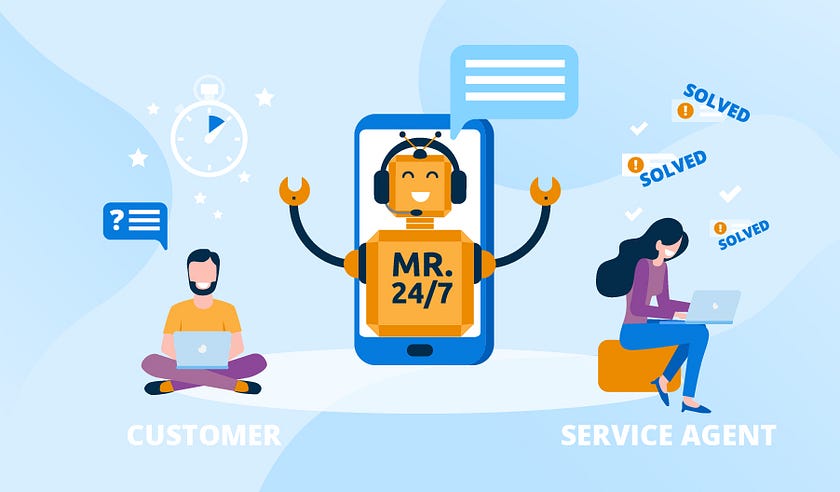Chatbot Customer Service: What is it & Its Use Cases

In just a decade, customer service has shifted dramatically from long wait times and complicated IVR menus to AI-powered, instant, and intelligent support experiences. What once relied heavily on overworked agents is now being handled by advanced chatbot systems.
According to a 2025 Harvard Business Review report, 85% of customer service leaders are adopting or experimenting with AI chatbots to automate critical functions — ranging from handling inquiries and refunds to resolving complaints. Thanks to breakthroughs in AI and natural language processing (NLP), these chatbots are no longer limited to simple automation. They now provide always-on support, personalized engagement, and human-like conversations at scale — all while delivering significant operational savings for businesses.
What Exactly Is Chatbot Customer Service?
Chatbot customer service uses AI-driven conversational interfaces to interact with customers across websites, apps, messaging platforms, and even voice assistants.
There are two primary models:
- Rule-based chatbots — Rely on predesigned flows and decision trees; best for FAQs and repetitive tasks.
- AI-powered chatbots — Use machine learning and natural language understanding (NLU) to interpret intent, learn over time, and manage complex conversations.
Most modern businesses use a layered approach, combining both models to handle a variety of queries efficiently.
How Do Chatbots Work Behind the Scenes?
Enterprise-grade chatbots are built on an intelligent architecture that brings together multiple systems:
- NLP/NLU engines to understand customer input.
- Dialogue management to maintain context and guide responses.
- Data integration layers that connect to CRMs, ticketing tools, knowledge bases, and more.
This ensures chatbots can do more than talk — they can update records, process transactions, retrieve data, or escalate issues when necessary.
Core Capabilities of AI Chatbots
Modern chatbot systems go far beyond scripted responses. Key features include:
- Intent recognition and smart routing.
- Automated ticket deflection with seamless escalation when required.
- 24/7 multilingual support across channels and geographies.
Together, these capabilities ensure consistent service delivery while reducing reliance on human agents for first-level queries.
Why Businesses Are Investing in Chatbots
AI chatbots deliver measurable business outcomes, such as:
- Faster resolutions and reduced average handling time (AHT).
- Lower operational costs by managing thousands of queries at once.
- Improved CSAT and NPS scores thanks to instant responses.
- Higher agent productivity as bots handle routine issues.
The result: leaner, more scalable, and customer-centric support operations.
Use Cases Across Industries
Chatbots have proven value across sectors:
- Retail & E-commerce — Order tracking, returns, product recommendations.
- Banking & Finance — Balance checks, fraud alerts, KYC assistance.
- Healthcare — Appointment scheduling, onboarding, insurance verification.
- Telecom & Utilities — Billing queries, plan renewals, outage notifications.
By enabling real-time self-service, chatbots reduce churn and build stronger customer trust.
Advanced Features Driving the Next Wave of Chatbots
Today’s enterprise chatbots are being enhanced with cutting-edge features such as:
- Sentiment analysis to adjust tone and urgency.
- Proactive engagement triggered by user actions (e.g., cart abandonment).
- Continuous learning to improve accuracy and relevance over time.
These advancements make interactions feel more natural, personalized, and intelligent.
[24]7.ai’s Approach to Enterprise Chatbots
At [24]7.ai, our conversational AI framework goes beyond words to understand intent, behavior, and context. Key differentiators include:
- Seamless deployment across digital and voice channels.
- Hybrid handoff to human agents with full conversation context.
- Native integration with CRMs, ITSM, and analytics platforms.
- Enterprise-grade security and compliance for industries like BFSI and healthcare.
From pre-sales support to post-service care, our chatbots cover the entire customer journey.
The Future Is Conversational
As service volumes continue to grow, AI-powered chatbots are becoming frontline digital workers — scaling effortlessly, offering personalized experiences, and remaining available 24/7. For businesses aiming to modernize customer support, reduce costs, and unlock deeper customer insights, chatbot-driven service is no longer optional — it’s essential.



Comments
Post a Comment